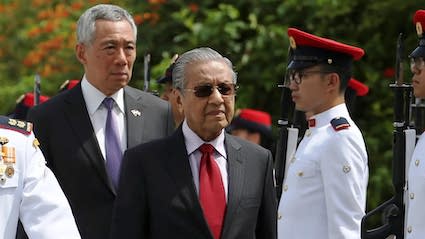Mahathir still living in the shadow of Lee Kuan Yew

Recent tough stance toward Singapore reflects rocky relations of the past
(Nikkei Asian Review) – Malaysia’s hard-line attitude with Singapore over a territorial dispute reflects the often fractious relationship that Prime Minister Mahathir Mohamad had with his peer, the late Lee Kuan Yew, founding father of the city-state.
The two countries have always had differences, but under former Malaysian Prime Minister Najib Razak, cooperation was on the rise. Now, with his successor Mahathir leading the country, Malaysia is walking back on previous agreements with its neighbor while ramping up tensions.
Its latest jabs at Singapore include extending the limits of Johor Bahru port into disputed waters and restricting flights by Singapore airplanes in Malaysian airspace. An emergency foreign ministerial meeting on Jan. 8 temporarily cooled tensions, but relations remain rocky.
After being swept into power last May, the Mahathir administration postponed until 2020 construction on a high-speed rail link between Kuala Lumpur and Singapore that would have cut land travel between the two cities to 90 minutes. Mahathir has also suggested hiking the price of water it supplies to Singapore, and is reviewing a stock market link that was proposed to smooth cross-border retail trading.
Najib’s approach to Singapore was markedly different. His administration promoted the huge Malaysia Iskandar development project in the state of Johor bordering Singapore, and kicked off the high-speed rail plan on which Iskander depends.
He also settled a long-simmering issue involving Malayan Railways, which formerly operated trains into the center of Singapore — a situation regarded as a drag on urban development. The city later praised Najib after his administration relocated the railway’s terminus closer to the border and returned land it had occupied back to the city.
Najib and current Singapore Prime Minister Lee Hsien Loong are 65 and 66, respectively. Their fathers, Razak Hussein and Lee Kuan Yew, also served as prime minsters. These similarities helped the two forge a bond that resulted in good relations between the countries.
Some analysts are now wondering what went wrong since Mahathir’s return to power. But the answer is fairly clear: He is simply “doing the reverse” of Najib, according to Jun Onozawa, visiting researcher at the Institute for International Trade and Investment.
The Mahathir coalition won last year’s election on a wave of public discontent directed against Najib’s alleged corruption, among other things. Now, Mahathir’s backtracking on the former prime minister’s policies is straining relations with Singapore, Onozawa said.
History also is playing a part in the current state of affairs, as the late Lee Kuan Yew had a somewhat contentious relationship with his former counterpart.
Malaysia gained independence from Britain in 1957 and Singapore followed later. Due to its lack of resources, however, the city became a Malaysian state in 1963.
It was not the best of unions. The central government of Malaysia, comprised primarily of indigenous Malays, and the state government of Singapore, its members largely of Chinese descent, often quarreled. Mahathir, then a young member of Malaysia’s parliament, demanded that the country’s majority Malays have more rights, while Lee espoused equal rights for all, including Chinese and Indians.
Fearing a rise in ethnic tensions, Malaysia expelled Singapore from the union after the two had been together for only 23 months. “For me, it is a moment of anguish,” Lee said at the time, and cried when he met the press as the first prime minister of Singapore — a nation with little land and scant resources.
From then, the two countries embarked on different paths. Malaysia adopted policies giving preferential treatment to “Bhumiputra” — ethnic Malays, who account for 70% of the population. Meanwhile, Singapore gave equal rights to all, despite 70% of its population being Chinese.
Mahathir and Lee became symbols of the two contrasting policies.
The former, who Lee called an “ultra Malay,” adopted a tough stance on Singapore after becoming independent — a view he holds to this day. He has called for a price hike for water supplied to Singapore and has accused its neighbor of cherry picking the benefits of the two countries’ relations to build an efficient economy.
Mahathir’s criticism of Singapore peaked during the Asian financial crisis of 1997. The nation became a market for short-selling Malaysia’s currency and stocks, dealing a serious blow to the country’s economy. Mahathir lashed out at Singapore, calling the hedge funds that operated out of it “rogues.”
Malaysia’s decision to review the stock market trading link reflects Mahathir’s bitter memory of the time, analysts say.
Malaysians have mixed feelings about Singapore and its rapid ascent into the club of developed nations. Even citizens of Chinese descent are split on their views. While many laud Singapore’s lack of ethnic discrimination, others criticize it as taking the best for itself, said Masashi Nakamura, an expert on Southeast Asian affairs at the Institute of Developing Economies.
But while Mahathir should drop any lingering animosity toward Lee — who was two years his elder and died in 2015 — he must keep his finger on the pulse of the nation and the region’s changing dynamics.
Tang Siew Mung, senior fellow at the ISEA-Yusof Ishak Institute, was born in Malaysia but now resides in Singapore. Having lived in both countries, Tang feels that the two are inextricably entwined, and that their mutual reliance cannot be changed.
“Too much is said [about] Singapore’s dependence on Malaysia for its water resources and food, while there is too little acknowledgment [of] how much Malaysia benefits from good relations with its southern neighbor,” he said, pointing out that Malaysian farmers’ biggest export market is Singapore.
And as members of the Association of Southeast Asian Nations, with each holding strategic locations in the region, any heightening of tensions between them could gravely affect the rest of Asia, especially as the bloc starts to seek its own Indo-Pacific strategy.

